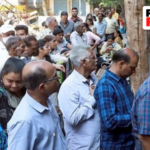Growing Double Burden of Malnutrition Among South Asian Women Before Pregnancy
According to a study published in The Lancet Regional Health Southeast Asia, there is a growing double burden of malnutrition among married women in South Asia before pregnancy. The prevalence of overweight now surpasses that of underweight, while anaemia and micronutrient deficiencies remain alarmingly high.
The analysis, conducted by researchers from University College London, UK, and the Population Council, India, found that short stature continues to be an issue, especially in India and Bangladesh, pointing to persistent concerns about malnutrition during early childhood and its long-term effects.
The study, published in The Lancet Regional Health Southeast Asia journal, analyzed data from national surveys of South Asian countries, including the National Family Health Survey in India. The researchers reviewed public policies and programmes that deliver interventions on preconception nutrition.
"Our analysis of nationally-representative survey data reveals a growing double burden of malnutrition among preconception women in South Asia, as the prevalence of overweight (ranging from 29 per cent to 57.8 per cent) now surpasses that of underweight (4.6 per cent to 15.7 per cent) among married women," the authors wrote.
Prevalence of short stature was estimated to be 10.7 per cent in India.
Urbanisation, migration, and increased availability of ultra-processed foods, even in rural areas, have driven a higher intake of fats, sugars, and calories, contributing to a worsening nutritional status. Anaemia remains persistently high in South Asia, despite intervention efforts. Vitamin D deficiency is a key concern, with studies reporting over two thirds of women in South Asia being deficient.
National survey data of Afghanistan shows that over 95 per cent of women in Afghanistan are low on vitamin D. Estimates of vitamin D deficiency appear to have reduced over time in India, but remain high in Pakistan and Afghanistan, both predominantly Muslim countries where most women wear clothing that reduces their skin’s exposure to the sun.
Looking at public policies and programmes related to preconception nutrition in eight South Asian countries, the authors found that most countries, except Sri Lanka, lack a universal programme for health and nutrition screening and at providing essential micronutrients. The countries also lack a counselling on healthy eating and treatment for at-risk women.
Addressing these barriers is critical to improving intervention effectiveness, programme implementation, and informed decision-making.
Reference : https://www.thehindu.com/sci-tech/health/rates-of-overweight-exceed-that-of-underweight-in-south-asia-study-on-pre-pregnancy-malnutrition/article69529715.ece








